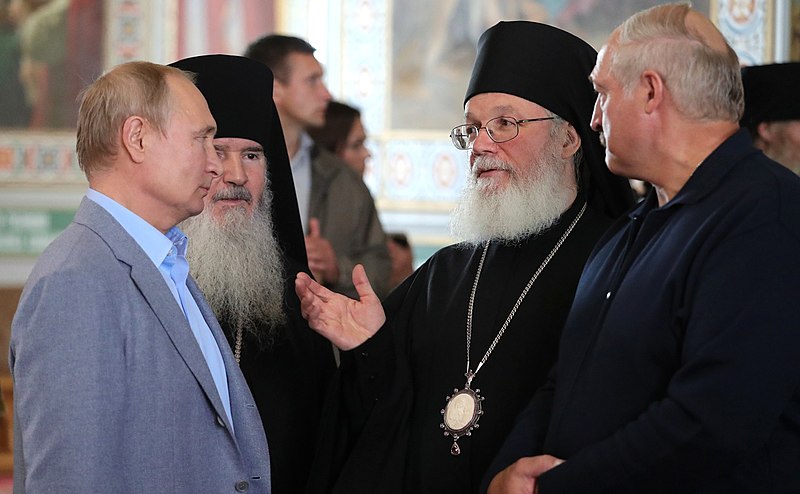
Image by Kremlin.ru
Russian officials invited the presidents of the United States and China, Donald Trump and Xi Jinping, as well as French leader Emmanuel Macron, to attend the traditional Victory Day Parade in Moscow. Instead, the head of the Kremlin, Vladimir Putin, hosted leaders from mainly ex-Soviet countries, including Belarus, Kazakhstan, Tajikistan, Moldova, and Uzbekistan, as well as Serbia and Bosnia and Herzegovina.
The parade was just another PR move ahead of the constitutional referendum scheduled for July 1. The World War II victory parade annually takes place in Russia on May 9, but the event was postponed due to the pandemic to June 24. Officially, the COVID-19 pandemic is the reason why world leaders did not come to Moscow this year, which means the Kremlin propagandists failed yet again to portray Russia as a global power and its President Putin as a modern tsar who was apparently supposed to mediate talks between Trump and Jinping.
Even though it was announced that Putin would meet with Belarusian President Alexander Lukashenko, the meeting did not take place. Originally, the two leaders were supposed to meet and discuss economic issues. Last year, Putin and Lukashenko met 12 times. However, on June 24 Lukashenko reportedly left for Minsk right after the parade. It is worth noting that Putin refused to handshake Lukashenko’s son Nikolay, while the Belarusian leader refused to stand right next to Putin during the event. On the other hand, the day prior to the parade, Russian President met with his Serbian counterpart Aleksandar Vucic, and the morning before the Victory Day celebration he met World War II veterans. He also met with the President of Uzbekistan Shavkat MirziyoyevIt, but not with Lukashenko. In addition, unlike other officials, Lukashenko did not wear the black-and-orange wartime St George’s ribbon. After the conflict in the Donbass erupted in 2014, Belarusian authorities de facto banned this symbol and simply replaced it with the colors of green-red flag of Belarus. All these symbolic gestures during the parade suggest that relations between Putin and Lukashenko are far from good. However, during the official ceremony Lukashenko said that “he has arrived to the capital of his homeland”. It could be partially true, since the Soviet Union was his homeland, and Moscow was its capital. Also, Moscow is the capital of the Russia – Belarus Union State, and the two countries share common history, language and religion. In spite of that, relations between Minsk and the Kremlin have been turbulent, especially after Moscow halted oil supplies to refineries in Belarus in January this year.
The Kremlin sees Belarus as a client state and also as an “energy vampire” that constantly seeks significant discounts on Russian energy, primarily gas and oil. Since the coronavirus is bringing radical transformation of global energy trade, it is quite questionable if Russia will keep supplying its only ally in Europe with cheap crude and natural gas. Belarus already started importing energy from other countries, but Lukashenko certainly does not want to break all ties with Moscow. At home, he is faced with waves of protests ahead of presidential election scheduled for August 9. At this point, Belarusian police successfully handle demonstrations, although there are indications that some foreign-backed structures are trying to cause mass riots in Belarus.
Anti-Lukasheko propagandists already started spreading fake news on how the Belarusian leader is apparently supported by just three percent of the Belarusian population. On social media they try to create an illusion how the Belarusian security apparatus is allegedly turning against Lukashenko. In reality, the situation in Belarus is firmly under Lukasheno’s control. However, his position is far from ideal. He is being pressured by both the Kremlin and its “dear Western partners”. It is worth remembering that last month he was ridiculed by both Russia and the West for holding a Victory Day parade on May 9 with local COVID-19 cases rising. Unlike Putin, Lukashenko did not postpone the parade, nor did he criticize Soviet leader Joseph Stalin, who played the key role in defeating Nazi Germany. In an article published by the National Interest, Putin recently wrote that “Stalin and his entourage, indeed, deserve many legitimate accusations”.
“We remember the crimes committed by the regime against its own people and the horror of mass repressions”, wrote Putin, whose father Vladimir Spiridonovich Putin worked for the very same regime as an officer of the internal troops of the NKVD up to 1941. There are, however, speculations that later he voluntarily joined Andrey Vlasov and his collaborationist army, which is why some critics describe the Russian President as a modern-day Vlasov who serves the interest of his “dear Western partners” rather than Russian people. In any case, the number of Russians expressing respect for Stalin increased from 28 percent in 2018 to 41 percent in 2019, according to the Levada Analytical Center.
In Belarus, same as in Russia, the Second World War is still an important topic, although current events may overshadow it. The coming days and months will be crucial for Lukashenko, as he may face numerous challenges. It remains to be seen what Russian policy will be regarding the Belarusian leader, but given the fact that over 2500 companies with Russian capital are operating in Belarus, it is not very probable the Kremlin will allow a serious destabilization of the East European country. After all, Putin reportedly invited Lukashenko to attend the opening of a monument to Soviet soldiers in the town of Rzhev on June 30, which means that the saga of Putin and Lukashenko will likely go on.

